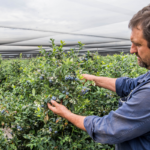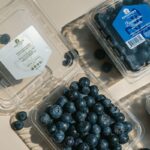RipeLocker containers hold blueberries eight weeks

Seattle-based RipeLocker, a company that specializes in extending the shelf life of perishables, recently held freshly harvested organic blueberries in one of its containers for eight weeks.
“Pristine” is what the grower, Blueberry Hill, called the blueberries when the RipeLocker containers were opened after the two-month storage period, according to a press release.
The low-atmosphere RipeLocker containers are used for storing and shipping fresh produce and flowers to extend post-harvest life.
They are pallet-size, made from recycled materials and are reusable.
The company leases the containers on an annual basis, and already-completed trials for berries, pomegranates, cherries, papayas and other items have been successful, according to the company.
“We have seen excellent results in our efficacy trials, including this one with Blueberry Hill, and are confident we will soon become the preferred container for storing and shipping perishables around the world,” said George Lobisser, CEO and co-founder of RipeLocker.
“In addition, the ultra-low oxygen and pressure environment of our RipeLocker containers makes them perfect for organics.”
Based on the results of the Blueberry Hill trial, the company plans to lease containers that will be available this summer.
Blueberry Hill owns the packing and storage facility for 20 blueberry growers in Washington State, Sorbatto Fresh, and the containers will allow the facility to extend its marketing window.
“We were extremely pleased with the pristine quality of the blueberries that had been stored in the RipeLocker containers for eight weeks,” Jeff Weijohn, owner of Blueberry Hill said.
“They looked like they came right out of the field. After seeing such great results, we quickly signed up to lease the RipeLocker containers as we anticipate a strong ROI from using them.”
RipeLocker Container Technology
RipeLocker containers use patented technology to manage the atmospheric pressure, humidity and composition of oxygen and CO2 within the containers, suppressing the growth of pathogens that lead to decay.
The containers also provide a mechanism for delivering organic fungicide vapors to kill pathogens.
Depending on the needs of each type of fresh produce, operating parameters such as internal pressure and oxygen/CO2 can be regulated to optimize longevity and freshness.
The containers also automatically respond to changes in storage and shipping environments. They are designed to be deployed and used in existing supply chains, according to the release.














































